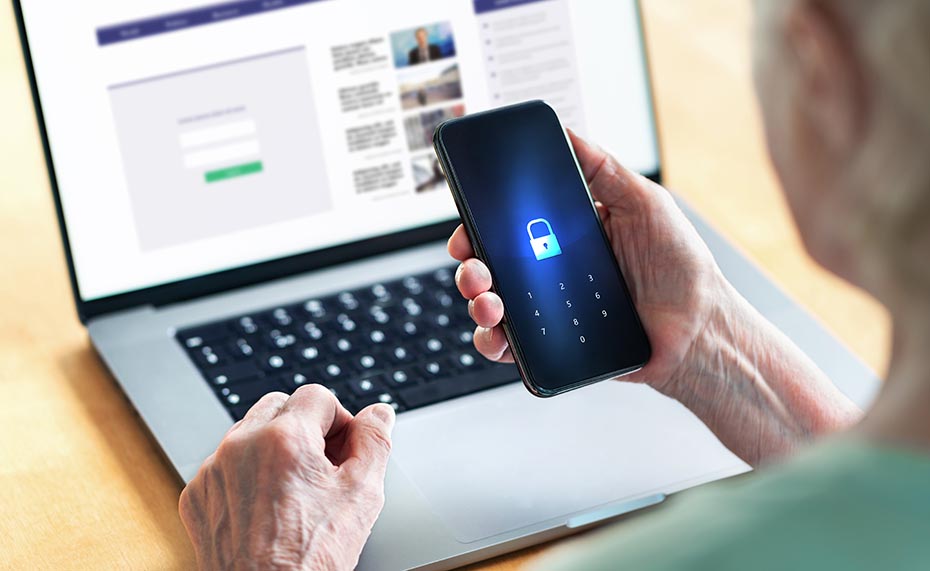Is Your Identity at Risk of Being Stolen?

Crooks looking to steal your identity want valuable information about you, which means sensitive data or personal details that are not available on public record. Anything that can be used to access your financial accounts or convincingly pose as you. So how do you protect yourself? There are important steps to take both digitally and in person at your home.
Steps to Take At Home & Digitally
Protect Your Personal Data
If you become aware of a data breach that may include your sensitive information, there are some steps you should quickly take to minimize your risk of identity theft:
- Change your passwords immediately. Experts say you should have a different password for each sensitive account — especially financial accounts. For tips to help secure your passwords, check out our Overview of Password Strength & Security article.
- Contact your financial institution or card issuers using the trusted phone number on the back of your card. Explain the situation and potential data breach; they may determine and explain the situation. They might issue you new cards.
- Monitor your bank and credit accounts regularly and report any suspicious activity immediately. Online and mobile banking make this easy, and you can even set alerts that can indicate problems. Learn more about Fidelity Bank enhanced account alerts.
- Check your credit report for questionable activity and request a fraud alert if you think you are an identity theft victim. Learn more about credit reports and alerts at annualcreditreport.com.
Protecting Important Papers at Home
Keeping your personal information safe doesn’t just stop with digital property, it can be physical property as well. Take a quick look around your house and you’ll get an idea of how easy it can be for someone to steal information about you. There are critical steps you should take within your space to help increase your security.
- Lock up or hide bank or credit card statements, checkbooks, utility bills or other important documents — such as tax returns — that could contain anything from account numbers and balances to your Social Security number. This is even more important if you plan to have people you don’t know well in and out of your home.
- Be careful where you put your purse or wallet and what you keep in it. You don’t want to expose your bank or credit card numbers or your medical insurance information. Don’t carry your Social Security card or a list of all your account usernames and passwords that could cause you all sorts of headaches if lost or stolen.
- Shred or destroy paper documents or plastic cards that you no longer need. This includes old bills, tax documents, credit offers you get in the mail, expired bank cards or paper checks. You should even peel labels off prescription bottles before throwing them away.
- When filling out paper forms at schools or offices, ask if all the information is necessary. If not, leave things blank when possible.
Victim of Identity Theft? What to Do Next.
If your identity has been stolen or you think you’re at risk, act quickly to protect yourself from any further financial damage. Contact your financial institution immediately by calling the number on the back of your card. Place a fraud alert to help protect your credit, and contact additional authorities as needed.
How to Place a Fraud Alert
Placing a fraud alert is free to do, but the protection it provides could be priceless. All you have to do is contact any one of the three major credit-reporting agencies:
- Equifax (1-800-685-1111)
- Experian (1-888-397-3742)
- TransUnion (1-888-909-8872)
Tell them that you may be a victim of identity theft and need to put a fraud alert on your credit file. Make sure to give the reporting agency your current contact information—such as a phone number and email address—so they can reach you if necessary. The agency you call is required to tell the others to set up alerts as well but ask just to make sure.
The fraud alert stays in effect for one year and allows you to get a free credit report from each of the three reporting agencies so you can check for irregularities. Use these reports to look for any unexpected credit applications in your name, or problems with bills, payments, or personal information. Quickly report any problem you might find so action can be taken.
Should You Place a Credit Freeze?
Financial institutions or other businesses check your credit report before approving loans or credit cards, and a credit freeze blocks that from happening. To freeze your credit, you’ll need to contact three main credit bureaus (Equifax, Experian, and TransUnion – numbers are above) and provide some required personal information. After access to your reports has been frozen, you can either temporarily lift or completely remove the freeze so lenders or creditors can access your reports if you need to apply for a loan, credit card, or utility service.
A freeze won’t block you from being able to use your own credit or bank cards, but it also won’t protect you from other types of fraud that don’t require credit checks, such as someone filing taxes in your name or stealing credit card or financial account numbers.
For additional resources and information about identity theft, please visit our resource page.
LEARN MORE
Fidelity Bank does not control the content of or approve any website that is linked through this browser. Search results are not filtered or screened by the bank or any of its agents, representatives or service providers. Users, who search the Internet using their browser, do so at their own risk, and are responsible for the results. The portals and links are provided by an outside source. Fidelity Bank is not responsible for the content.